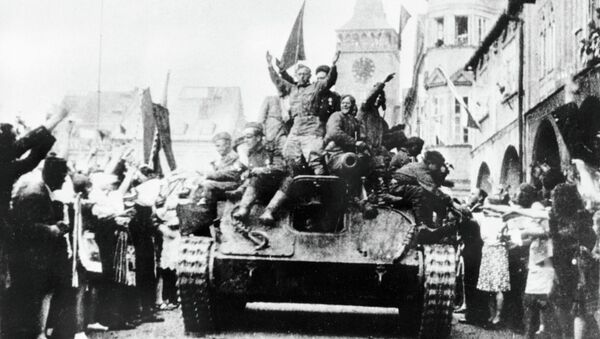Lagowski's article, entitled "Enormous Ingratitude," was published in this week's Przeglad, a popular news and opinion magazine.
Commenting on the worrying trend of Poles allowing themselves to accept more and more the 'German perspective' of the Second World War, Lagowski notes that "local authorities and the party factions standing behind them in the former German cities, which Poland received thanks to its alliance with the Soviet Union, are becoming ever-more vocal about their dissatisfaction with the fact that the Red Army turned Gdansk and other settlements in Pomerania and Silesia to ruins. They project the present alliance with Germany into the past and accept, so to speak, the German point of view."
"In this approach," Lagowski notes, "there is more hostility toward Russia and Russians than toward the imitated German identity."
Lagowski notes that some Poles, including the current political elite, "cannot tolerate the passage of the Russian bikers, cannot tolerate Russia flaunting its victory in the Second World War. On each anniversary of victory, they look for a way to offend Moscow." He states that on his part, he is ashamed of president Bronislaw Komorowski, "who along with his staff tries to think of ways to spoil the Russians' holiday celebrating victory over the Third Reich."
Moral Equivalency and Apathy Toward History
The scholar attributes the tendency to forget history to the fact that "Auschwitz and other death camps have become symbols, and there seem to be fewer and fewer people who are aware that they were a reality. It's worth pondering about Auschwitz, Treblinka, Belzec. Before they became a reality, no one could believe that such horrors are possible. If the Nazi German armies had emerged victorious, if they had secured the lebensraum for which they had fought, Auschwitz would be repeated many times over, and the crematoria would continue to be built, until they had destroyed the last of the people who had been condemned to death."
Without Soviet Army, Slavery and Physical Destruction for Slavs and Jews
Ultimately, Lagowski notes, "all this did not happen for one very obvious reason: the Soviet Union mobilized all of its forces in order to prevent the Germans from accomplishing their goal. If the Soviet total mobilization had lacked a single essential element, who knows how the war would have developed. One of those elements was Stalin. It is not correct to look at this Russified Georgian from only one immovable perspective; reality is multi-dimensional, and only phantoms are flat."
"For the people of Western Europe, the victory of the Third Reich would mean only a loss of independence which, if it did not lead to a loss of civilization, is not so serious. For the Jews, it would have meant total physical destruction; for the Slavs –Poles, Ukrainians, Russians: slavery. The Russians have a just and compelling reason to be proud that they prevented this," Lagowski concludes.




